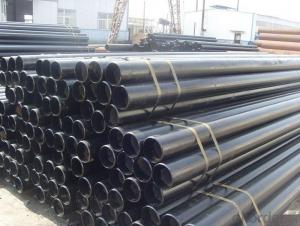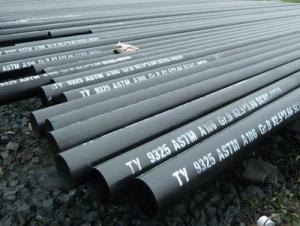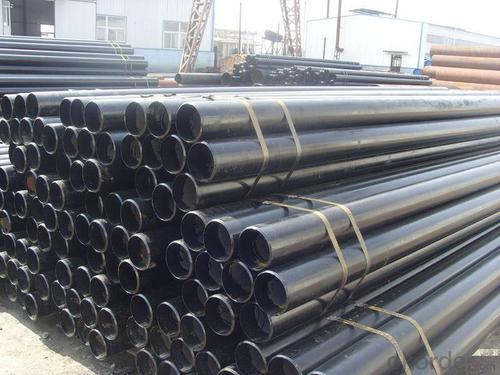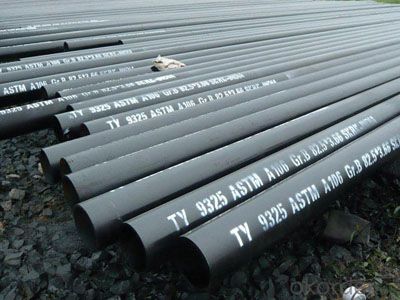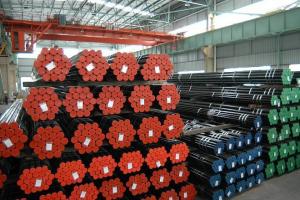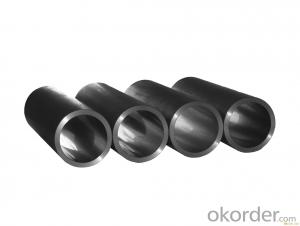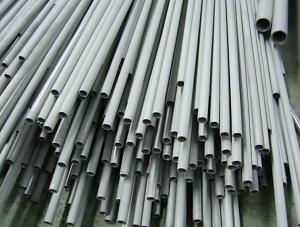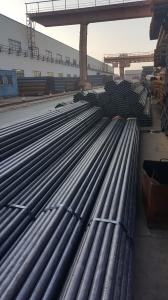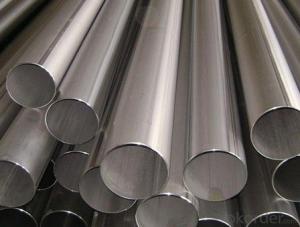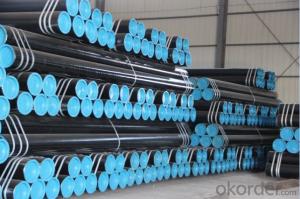GB ASME API 5L Seamless Steel Line pipe
- Loading Port:
- Tianjin
- Payment Terms:
- TT or LC
- Min Order Qty:
- 25 m.t.
- Supply Capability:
- 10000 m.t./month
OKorder Service Pledge
OKorder Financial Service
You Might Also Like
We are company that have many years experience and professional manager team and engineer team and sales team, sure we will provide you high quality of pipe and professioanl service.
Seamless pipe possesses a hollow section and without seam around the strip steel. It is made with solid bar or steel ingot by perforating machine. As the facture process does not include any welding, seamless pipes are considered to be stronger and more durable. Generally speaking, seamless pipe has better pressure resistance and security than other classifications, and was usually more easily available than welded pipe.
2、Main Features of the Seamless Pipe:
• High working accuracy
• High strength
• Small inertia resistance
• Strong therming dissipine ability
• Good appearance
• Reasonble price
3、Seamless Pipe Specification:
Standard | GB, DIN, ASTM ASTM A106-2006, ASTM A53-2007 |
Grade | 10#-45#, 16Mn 10#, 20#, 45#, 16Mn |
Thickness | 8 - 33 mm |
Section Shape | Round |
Outer Diameter | 133 - 219 mm |
Place of Origin | Shandong, China (Mainland) |
Secondary Or Not | Non-secondary |
Application | Hydraulic Pipe |
Technique | Cold Drawn |
Certification | API |
Surface Treatment | factory state or painted black |
Special Pipe | API Pipe |
Alloy Or Not | Non-alloy |
Length | 5-12M |
Outer Diameter | 21.3-610mm |
Grade | 20#, 45#, Q345, API J55, API K55, API L80, API N80, API P110, A53B |
Standard | ASME, ASTM |
1) Material:20#(ASTM A 106/A53 GRB.API5LGRB,GB),45#,16Mn,10#.
2) Specification range: OD: 21.3-610mm, WT:6-70mm, length:6-12m or according to the requirement of clients.
3) Executive standards: GB, ASME API5L.ASTM A 106/A53,Despite of the above standards, we can also supply seamless steel pipe with standard of DIN, JIS, and so on, and also develop new products according to the requirements of our clients!
4) Surface: black lacquered, varnish coating or galvanized.
5) Ends: Beveled or square cut, plastic capped, painted.
6) Packing: bundles wrapped with strong steel strip, seaworthy packing.
4、Packaging & Delivery:
Packaging Details: | seaworthy package, bundles wrapped with strong steel strip |
Delivery Detail: | 15-30days after received 30%TT |
5、FAQ of Seamless Pipe:
①How is the quality of your products?
We have many years business experience in this area, and we have professional engineer and manager team and sure we can provide you high quality production and professional service.
②How about price?
Yes, we are factory and be able to give you lowest price below market one, and we have a policy that “ for saving time and absolutely honest business attitude, we quote as lowest as possible for any customer, and discount can be given according to quantity”,if you like bargain and factory price is not low enough as you think, just don’t waste your time.Please trust the quotation we would give you, it is professional one.
③Why should you chose us?
We can give you both.Additionally, we can also offer professional products inquiry, products knowledge train(for agents), smooth goods delivery, exellent customer solution proposals.Our service formula: good quality+good price+good service=customer’s trust
SGS test is available, customer inspection before shipping is welcome, third party inspection is no problem.
6、Seamless Pipe Images:
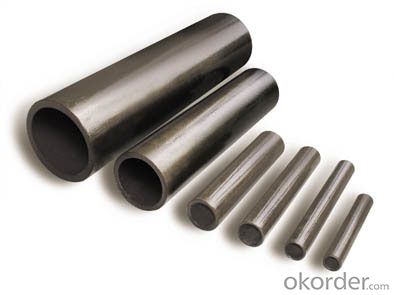
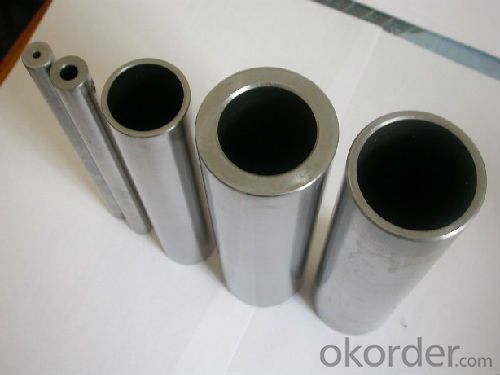
- Q: Can steel pipes be used for underground oil pipelines?
- Yes, steel pipes can be used for underground oil pipelines. Steel pipes are commonly used in the construction of underground oil pipelines due to their strength, durability, and resistance to corrosion. They are able to withstand the high pressure and weight of the oil being transported, as well as any external forces such as soil movement or seismic activity. Additionally, steel pipes can be coated or lined with materials such as epoxy or polyethylene to further protect against corrosion and increase their lifespan. Overall, steel pipes are a reliable and widely used choice for underground oil pipelines.
- Q: What are the non-destructive testing methods used for steel pipes?
- Some of the non-destructive testing methods used for steel pipes include ultrasonic testing, magnetic particle testing, liquid penetrant testing, radiographic testing, and eddy current testing.
- Q: What is the role of steel pipes in the mining and extraction of minerals?
- Steel pipes play a critical role in the mining and extraction of minerals as they are used for various applications throughout the process. These durable pipes are commonly employed to transport and distribute water, chemicals, and compressed air to different areas of the mine. Additionally, steel pipes are utilized in the construction of mine shafts, tunnels, and underground structures, providing stability and support. Their ability to withstand harsh conditions, resistance to corrosion, and high strength make steel pipes an indispensable component in the mining industry.
- Q: What are the safety considerations when working with steel pipes?
- There are several crucial safety considerations to bear in mind when working with steel pipes. To begin with, it is imperative to wear the appropriate personal protective equipment (PPE). This includes safety glasses or goggles to shield the eyes from debris or sparks, gloves to protect the hands from sharp edges or hot surfaces, and steel-toed boots to safeguard the feet from falling objects or heavy equipment. Additionally, it is advisable to wear a hard hat to shield the head from potential falling objects or hazards overhead. Moreover, one must be mindful of the weight and size of the steel pipes. Handling heavy pipes can strain the back and muscles, so it is essential to utilize proper lifting techniques and seek assistance when necessary. The use of lifting equipment, such as cranes or forklifts, can also help prevent injuries associated with heavy lifting. Another safety consideration is the risk of cuts or punctures. Steel pipes may have sharp edges or burrs, so it is important to handle them with care and wear suitable gloves to minimize the risk of injury. It is also recommended to inspect pipes for any defects or sharp edges before working with them. Furthermore, working with steel pipes may involve welding or cutting, which can generate sparks, heat, and fumes. It is vital to work in a well-ventilated area or employ proper ventilation equipment to ensure the elimination of harmful gases or fumes. Fire safety precautions, such as having fire extinguishers nearby and adhering to proper procedures for hot work, should also be taken. Lastly, one must be aware of potential hazards associated with working at heights or in confined spaces. When working on elevated platforms or scaffolding, fall protection measures, like safety harnesses or guardrails, should be in place. In confined spaces, proper ventilation and monitoring for hazardous gases are essential to prevent asphyxiation or exposure to toxic substances. By adhering to these safety considerations and following proper procedures, the risk of accidents or injuries when working with steel pipes can be significantly reduced.
- Q: What are the different end types for steel pipes?
- There are several different end types for steel pipes, each serving a specific purpose. Some common end types include: 1. Plain End: This is the most basic type of end for steel pipes, where the pipe has no threading or any other special end treatment. Plain ends are typically used for non-threaded applications or when the pipe is intended to be welded. 2. Threaded End: Threaded ends have male threads on one or both ends of the pipe, allowing for easy connection with other threaded fittings or pipes. This type of end is commonly used in plumbing and gas applications where the pipe needs to be easily assembled or disassembled. 3. Beveled End: Beveled ends are cut at an angle, typically 30 or 45 degrees, to facilitate welding. The bevel creates a smooth transition between the pipe and the weld joint, ensuring a strong and secure connection. Beveled ends are commonly used in construction, oil and gas, and pipeline industries. 4. Coupling End: Coupling ends have female threads on both ends of the pipe, enabling two pipes to be joined together using a coupling or a fitting. This type of end is often used in plumbing systems or for connecting sections of pipes that need to be easily disassembled. 5. Flanged End: Flanged ends have a flared or raised lip on one or both ends of the pipe, allowing for easy attachment to other flanged components, such as valves or pumps. Flanged ends are commonly used in industrial applications where the pipe needs to be securely connected to other equipment. 6. Socket Weld End: Socket weld ends have a socket or recess on one or both ends of the pipe, allowing for easy connection with socket weld fittings. This type of end provides a strong and reliable joint, commonly used in high-pressure applications, such as petrochemical or power plants. These are just a few examples of the different end types for steel pipes. The choice of end type depends on the specific application requirements, such as the need for easy assembly, disassembly, or compatibility with other fittings.
- Q: What is the fatigue strength of steel pipes?
- The fatigue strength of steel pipes refers to their ability to withstand repeated cyclic loading without experiencing failure. It is a critical characteristic for pipes that are subject to dynamic or fluctuating loads, such as those used in the oil and gas industry, transportation infrastructure, or industrial applications. The fatigue strength of steel pipes can vary depending on several factors, including the steel grade, pipe dimensions, manufacturing process, surface conditions, and environmental factors. Steel pipes with higher tensile strength and toughness generally exhibit better fatigue resistance. The fatigue strength is typically determined through fatigue testing, which involves subjecting the pipes to cyclic loading until failure occurs. The results are then used to establish a fatigue curve or S-N curve, which represents the relationship between the applied stress amplitude and the number of cycles to failure. The fatigue strength is commonly expressed as the stress amplitude required to cause failure after a specific number of cycles, such as the stress amplitude at 10 million cycles (S-N10^7). It is important to note that fatigue strength is influenced by other factors, such as mean stress, surface finish, and loading frequency, which may need to be considered in specific applications. Overall, the fatigue strength of steel pipes is a crucial factor to consider in engineering design and maintenance, as it helps ensure the long-term integrity and reliability of the pipes under cyclic loading conditions.
- Q: How are steel pipes used in the construction of irrigation systems?
- Steel pipes are commonly used in the construction of irrigation systems due to their strength and durability. These pipes are used to transport water from a water source, such as a well or reservoir, to the desired areas for irrigation. They are often used in underground or above-ground applications, providing a reliable and efficient means of delivering water to crops or plants. Steel pipes are resistant to corrosion and can withstand high pressure, making them ideal for irrigation systems that require long-term functionality.
- Q: Can steel pipes be used for firefighting systems?
- Indeed, firefighting systems can utilize steel pipes. Steel pipes are frequently chosen for their robustness and ability to endure high temperatures, making them ideal for transporting water and other fire-suppressing agents. Typically, these pipes are employed in larger commercial or industrial structures that necessitate a larger flow rate and pressure for their fire protection systems. Additionally, steel pipes possess the benefit of withstanding external forces and impacts, thus ensuring the integrity of the firefighting system. Moreover, steel pipes offer the convenience of easy connection, simplifying installation and maintenance procedures. Nonetheless, it is crucial to ensure that the steel pipes employed in firefighting systems undergo appropriate treatment to prevent corrosion and rusting, as these factors may compromise their effectiveness during emergency situations. Regular inspections and maintenance are necessary to guarantee the reliability and functionality of the steel pipes within the firefighting system.
- Q: Can steel pipes be used for underground water treatment systems?
- Yes, steel pipes can be used for underground water treatment systems. Steel pipes are commonly used in underground applications due to their durability, strength, and resistance to corrosion. They provide a reliable and long-lasting solution for transporting water in underground water treatment systems.
- Q: Can galvanized pipe be welded with seamless steel tube? What should I do to connect?
- See the galvanized pipe and seamless steel pipe steel that differences in how if the difference is too large then the steel used for two kinds of materials for welding requirements is not the same, do not recommend direct welding, low pressure can be used in high voltage wire, welding on both sides of the same material flange with flange connection.
Send your message to us
GB ASME API 5L Seamless Steel Line pipe
- Loading Port:
- Tianjin
- Payment Terms:
- TT or LC
- Min Order Qty:
- 25 m.t.
- Supply Capability:
- 10000 m.t./month
OKorder Service Pledge
OKorder Financial Service
Similar products
Hot products
Hot Searches
Related keywords
